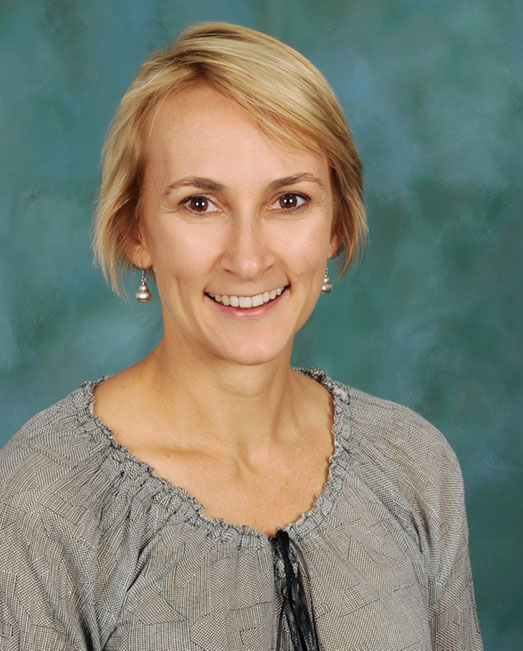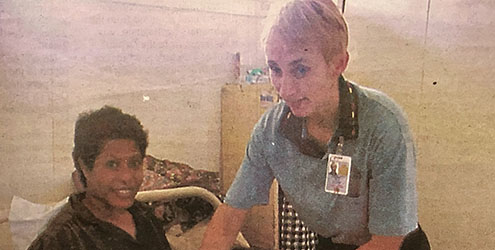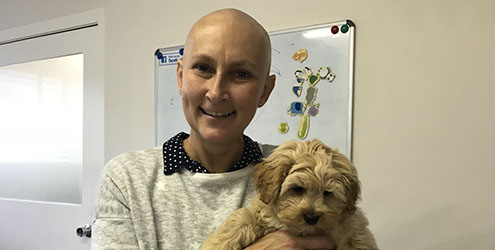Career
Copyright@ Australian Catholic University 1998-2026 | ABN 15 050 192 660 CRICOS registered provider: 00004G | PRV12008
Copyright@ Australian Catholic University 1998-2026 | ABN 15 050 192 660 CRICOS registered provider: 00004G | PRV12008

It was mid-2018 when Shoni Philpot, the former nurse who’d spent more than a decade managing Queensland Health’s Cancer Control Analysis Team, and who’d recently become head honcho at Cancer Alliance Queensland (CAQ), got the news that many of us fear: she was diagnosed with cancer.
“The irony was not lost on me, if I’m honest, having worked in this field for so long,” says Ms Philpot, whose career has focused on cancer treatment, data and research for almost two decades.
In some ways, Shoni’s clinical knowledge of the disease and its management was a godsend.
“I was familiar with the health system, I understood the terminology and I knew who all the people were, so I could pick and choose who I’d approach to assist with treatment. These were all good things.”
The difficulties came when she had an uncommon and severe reaction to her treatment. Shoni spent months in and out of hospital, dealing with debilitating side effects.
“That certainly gave me another perspective, even thinking back on my own time as a nurse and the things you say or do with families going through that process,” she says.
“No matter who you are, the time after a cancer diagnosis is a time of reflection, and if you’re lucky, it can also be a time of change and personal growth. It’s something that you live with for the rest of your natural life.”
Some two decades ago, Shoni Philpot had a life-changing experience of a different kind.
It was early 2001, and Shoni was a registered nurse working in the burns unit at the Queensland Children’s Hospital in Brisbane.
Around 2,500 kilometres north, in a remote province of Papua New Guinea, the kerosene-fuelled stoves and lamps commonly used in the homes of mountain villagers started to explode. The result was devastating, destroying several homes the Madang province.
“It was a terrible accident,” says Shoni, who was rushed to PNG with a plane-load of medical gear, and spent two weeks treating patients and training local healthcare staff in acute care.
As was later acknowledged, petrol had been mistakenly added to the kerosene sold to villagers, making it extremely volatile when lit.

Shoni in PNG.
“Dozens of people were badly injured with burns that would scar them for life, and some people were killed,” Shoni recalls. “Many of the injured people lived in remote areas, so it took days for them to come down from the mountains to seek medical help.”
Up until that point of her career, Shoni had been focused on caring for children, having completed a Graduate Diploma in Paediatric Care and a Bachelor of Nursing at ACU. Her time in PNG exposed her to treating mostly adult patients, and to conditions she was unaccustomed to.
“We set out to provide the whole package of care but we faced many limitations,” says Shoni, who adds that the company responsible for the accident was supportive of her efforts, providing resources and supplies whenever they were required.
“We didn’t have running water there for a while, so we were forced to send injured people down to the ocean with a bar of soap. But we adapted to the circumstances as best we could, and by the end of my time there, I had learned a lot and was a better nurse.”
Shoni’s career began at a time when nursing education in Australia happened primarily on the job in the wards of public hospitals.
By the time she started her bachelor’s degree at ACU, she was already an experienced paediatric nurse, having worked for years at the Women’s and Children’s Hospital in Adelaide, and the Royal Children’s Hospital in Brisbane.
While studying nursing at university didn’t change the way she approached her job, it did give her a greater appreciation of the role that research can play in improving care.
“It piqued my interest in academia,” says Shoni, who has since published several academic articles on oncology, clinical leadership and health services management.
“As my career evolved, I started to get involved in the research side of nursing from an improvement perspective, asking the question, ‘How do you make things better for those receiving care?’”
As a senior nurse and policy officer at Queensland Children’s Hospital over 14 years, Shoni was responsible not only for the management of busy clinical wards, but also for the completion of several transformation programs, incorporating governance, technology and digital innovation.
Her interest in service improvement eventually led her to cancer care and treatment, an area she’s been involved in since 2006 in her role as manager of Queensland Health’s Cancer Control Analysis Team, and for almost two decades as a founding member of Cancer Alliance Queensland.
Since 2004, the Alliance has pursued a goal of using technology and data to achieve clinician-led service improvement.
“It’s about using information and innovation more smartly, in a way that improves the lives of people with cancer,” says Shoni, the organisation’s senior director and “data queen”.
“The goal is to put those tools into the hands of the clinicians who need to understand what’s going on, so they have real-time information at their fingertips to ensure people with cancer are getting the best treatment and management plans possible.”
Years down the track, Shoni made a return to academia, commencing a PhD on clinician engagement through the lens of positive organisational scholarship.
As part of her research, she has interviewed scores of clinicians from all sectors of healthcare, and asked them what it’s like to work for Queensland Health.
Their answers have revealed that healthcare workers tend to hold strong values and a sound moral purpose.

Shoni during cancer treatment.
“These people come to work every day because they want to do the right thing, and their rhetoric gives us insights into that,” says Shoni, who expects to complete her PhD in 2022.
“If we can be clever about how we reflect on and engage with that rhetoric, we can use it to pursue a more positive agenda, so that we understand where others are coming from and improve the way we all work together.”
This willingness to strive for improvement has characterised many of Shoni’s achievements in her decades-long health career.
It’s what drove her to embark on a new project in 2019, after completing her treatment for breast cancer.
Together with her CAQ colleague Hazel Harden, whose 13-year-old son was also diagnosed with cancer, she founded the charitable organisation Australian Families 4 Genomics (AF4G).
Genomic sequencing can fast-track the identification of smarter, kinder and more effective treatment options for cancer patients; yet, at present, it is not routinely offered to those diagnosed with the condition.
AF4G wants to see genomics become more prevalent in cancer management, accelerating treatments that heal while doing less harm to patients.
With years of clinical, data and research experience, Shoni and Hazel make a formidable duo.
Their overall goal is to give children and young people diagnosed with cancer the prospect of a better life.
“That’s as complicated as it gets,” says Shoni, who believes the widespread use of genomics could be life-changing for cancer patients.
“At the moment, 95 per cent of children and young people with cancer will experience a significant health condition as a direct result of their treatment. From where we sit, that’s just not good enough, and we want to play a role in making that change.”
Whether it’s cancer patients, burns victims, or those with other medical conditions, Shoni’s career purpose is simple: to make things better for those in need of clinical care.
“If we can step back and reflect on our practice and improve the way we do things as clinicians, the impact for patients is huge,” she says.
“It’s about using the tools we have at hand – technology, data, information – but using it in a clever way, so we can improve people’s lives, and help them to move towards a better place.”
Keen to pursue a career in nursing or health management? Explore the options.
Copyright@ Australian Catholic University 1998-2026 | ABN 15 050 192 660 CRICOS registered provider: 00004G | PRV12008